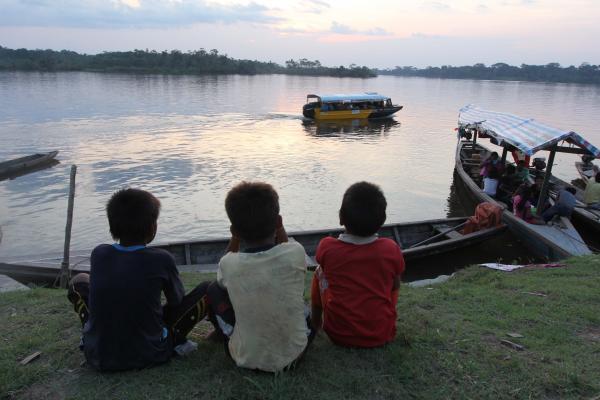Don’t Drink the Feces: Indigenous Seek Results for Peru’s Toxic Waters

When Ander Ordóñez learned the extent of pollution among the Kukama indigenous communities along the Marañón River in Peru’s northeastern Amazon region, he was not surprised.
He had accompanied the experts who took water, soil and sediment samples last September, and the pools of crude petroleum and other damage he saw in near oil wells and along a pipeline was “terrible,” he said. “We can’t just stand by and do nothing.”
In the wake of government findings of heavy metals, including lead and cadmium, in the area and a determination that drinking water in 17 out of 17 villages tested was unfit for human consumption, Kukama leaders are calling for health studies and a halt to oil pumping until the pipeline is repaired.
“The soul of the Kukama people is deeply wounded,” said Alfonso López, president of the Cocama Association for Development and Conservation (Asociación Cocama de Desarrollo y Conservación San Pablo de Tipishca, Acodecospat). “And we are angry at the government, not only because it is killing us, but because it is affecting our children, their children and the generations to come, because much of the damage that is occurring now will be irreversible in the future.”
Leaders from 48 Kukama communities gathered in López’s village, Dos de Mayo, in Peru’s Loreto region, on February 19 to hear representatives of half a dozen government agencies present the results of the environmental testing.
Concentrations of heavy metals were highest in Block 8X, one of Peru’s oldest oil fields, which has been operating for four decades in a wetland area that is now the Pacaya Samiria Natural Reserve, and which has been home to indigenous communities for generations.
Pollutants were also found in lakes used for fishing and in the broad Marañón River, a major tributary of the Amazon, from which many communities draw their drinking water.
Perhaps of greatest concern was the finding by the Health Ministry’s Environmental Health Office that none of the water in the 17 communities where it took samples was safe for human consumption. All of the samples contained fecal coliforms indicating contamination from human waste, and some contained arsenic.
Read more at http://indiancountrytodaymedianetwork.com/2014/03/03/dont-drink-feces-indigenous-seek-results-perus-toxic-waters-153819